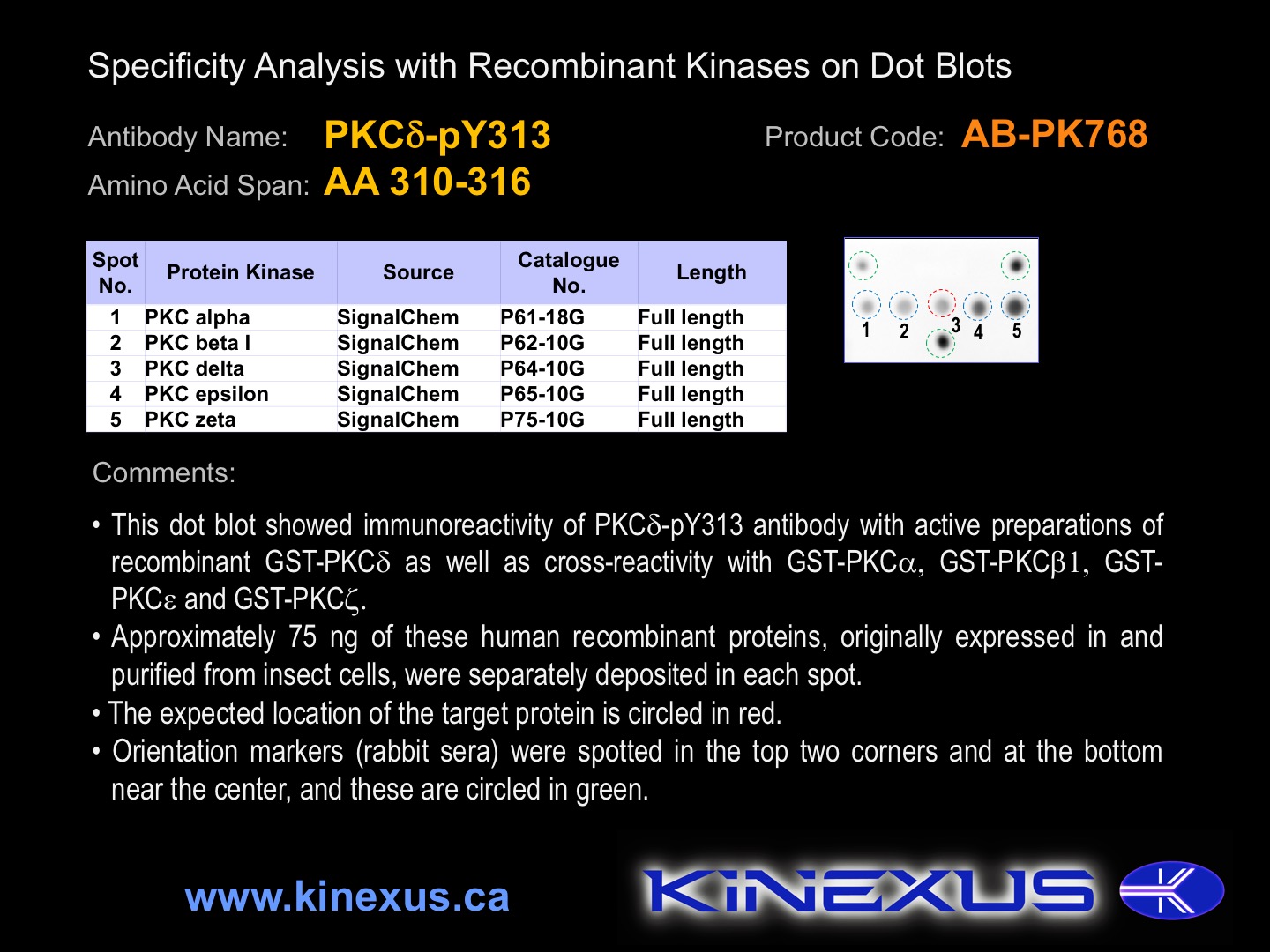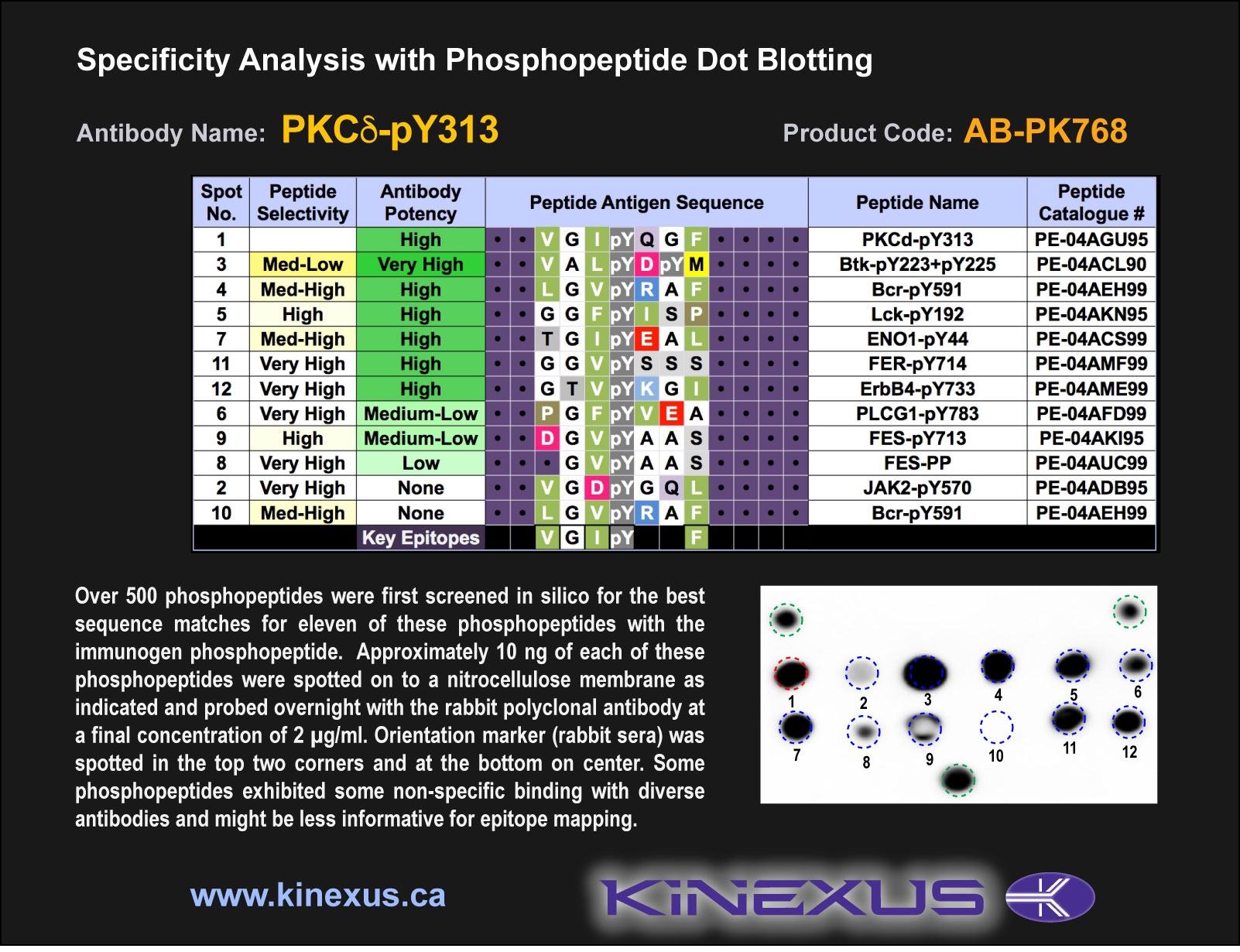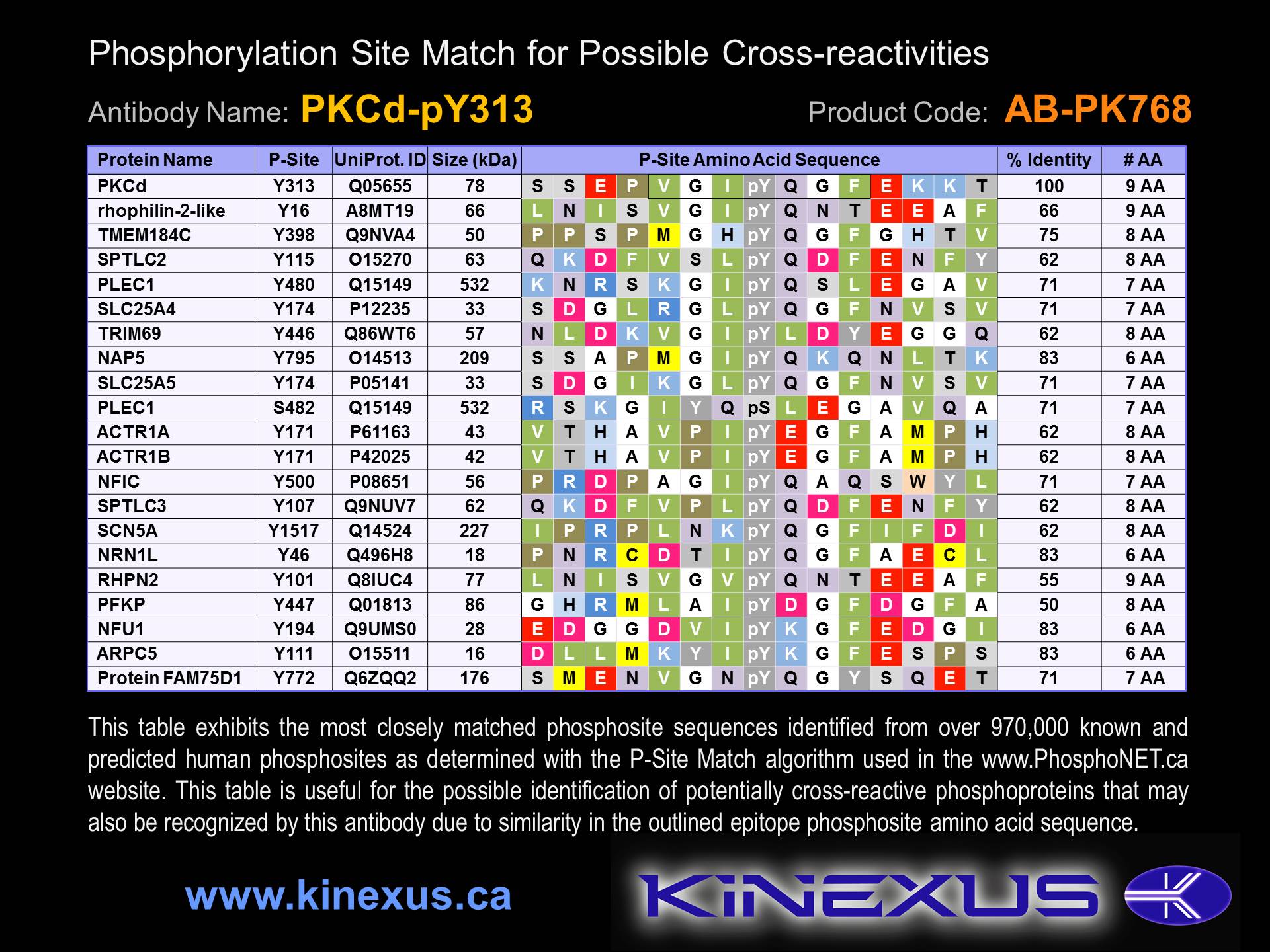Product Name: PKCd-pY313
Product Number: AB-PK768
| Size: | 25 µg | Price: | 89.00 | |
| $US |
Target Full Name: Protein-serine kinase C delta
Target Alias: Kinase PKC-delta; KPCD; MAY1; MGC49908; nPKC-delta; PKC-delta; PRKCD; Protein kinase C, delta; CCDS2870.1; ENSG00000163932
Product Type Specific: Protein kinase phosphosite-specific antibody
Antibody Code: PK768
Antibody Target Type: Phosphosite-specific
Antibody Phosphosite: Y313
Protein UniProt: Q05655
Protein SigNET: Q05655
Antibody Type: Polyclonal
Antibody Host Species: Rabbit
Target Alias: Kinase PKC-delta; KPCD; MAY1; MGC49908; nPKC-delta; PKC-delta; PRKCD; Protein kinase C, delta; CCDS2870.1; ENSG00000163932
Product Type Specific: Protein kinase phosphosite-specific antibody
Antibody Code: PK768
Antibody Target Type: Phosphosite-specific
Antibody Phosphosite: Y313
Protein UniProt: Q05655
Protein SigNET: Q05655
Antibody Type: Polyclonal
Antibody Host Species: Rabbit
Antibody Immunogen Source: Human PKCd (PRKCD) sequence peptide Cat. No.: PE-04AGU95
Antibody Immunogen Sequence: VGI(pY)QGF(bA)C
Antibody Immunogen Description: Corresponds to amino acid residues V310 to F316; In the region between the C1_1 domain and the protein kinase catalytic domain.
Antibody Immunogen Sequence: VGI(pY)QGF(bA)C
Antibody Immunogen Description: Corresponds to amino acid residues V310 to F316; In the region between the C1_1 domain and the protein kinase catalytic domain.
Production Method: The immunizing peptide was produced by solid phase synthesis on a multipep peptide synthesizer and purified by reverse-phase hplc chromatography. Purity was assessed by analytical hplc and the amino acid sequence confirmed by mass spectrometry analysis. This peptide was coupled to KLH prior to immunization into rabbits. New Zealand White rabbits were subcutaneously injected with KLH-coupled immunizing peptide every 4 weeks for 4 months. The sera from these animals was applied onto an agarose column to which the immunogen peptide was thio-linked. Antibody was eluted from the column with 0.1 M glycine, pH 2.5. Subsequently, the antibody solution was neutralized to pH 7.0 with saturated Tris.This antibody was also subject to negative purification over phosphotyrosine-agarose.
Antibody Modification: Unconjugated. Contact KInexus if you are interest in having the antibody biotinylated or coupled with fluorescent dyes.
Antibody Modification: Unconjugated. Contact KInexus if you are interest in having the antibody biotinylated or coupled with fluorescent dyes.
Antibody Concentration: 1 mg/ml
Storage Buffer: Phosphate buffered saline pH 7.4, 0.05% Thimerasol
Storage Conditions: For long term storage, keep frozen at -40°C or lower. Stock solution can be kept at +4°C for more than 3 months. Avoid repeated freeze-thaw cycles.
Product Use: Western blotting | Antibody microarray
Antibody Dilution Recommended: 2 µg/ml for immunoblotting
Antibody Species Reactivity: Human
Antibody Positive Control: The observed molecular mass of the processed target protein on SDS-PAGE gels is reported to be around 78-85 kDa.
Antibody Specificity: Very high
Storage Buffer: Phosphate buffered saline pH 7.4, 0.05% Thimerasol
Storage Conditions: For long term storage, keep frozen at -40°C or lower. Stock solution can be kept at +4°C for more than 3 months. Avoid repeated freeze-thaw cycles.
Product Use: Western blotting | Antibody microarray
Antibody Dilution Recommended: 2 µg/ml for immunoblotting
Antibody Species Reactivity: Human
Antibody Positive Control: The observed molecular mass of the processed target protein on SDS-PAGE gels is reported to be around 78-85 kDa.
Antibody Specificity: Very high
Antibody Cross Reactivity: No significant cross-reactive proteins detected in HEK-293 and Jurkat cells, except in Jurkat cells, phenylarsine oxide (PAO) increased detection of 75-85 and 15 kDa proteins.
Related Product 1: PKCd-pY313 blocking peptide
Related Product 2: PKCd-pY334 phosphosite-specific antibody (Cat. No.: AB-PK769)
Related Product 3: PKCd-pT507 phosphosite-specific antibody (Cat. No.: AB-PK767)
Related Product 4: CREB1 (123-135) KinSub - cyclic-AMP response element binding protein-1 (K123-R135, human) peptide; Crebtide protein kinase substrate peptide
Related Product 5: PKCDSubtide - PKCd (PRKCD) protein kinase substrate peptide
Related Product 1: PKCd-pY313 blocking peptide
Related Product 2: PKCd-pY334 phosphosite-specific antibody (Cat. No.: AB-PK769)
Related Product 3: PKCd-pT507 phosphosite-specific antibody (Cat. No.: AB-PK767)
Related Product 4: CREB1 (123-135) KinSub - cyclic-AMP response element binding protein-1 (K123-R135, human) peptide; Crebtide protein kinase substrate peptide
Related Product 5: PKCDSubtide - PKCd (PRKCD) protein kinase substrate peptide
Scientific Background: PKCd (PRKCD, PKC-delta) is a protein-serine/threonine kinase in the novel protein kinase C family. It is dependent on acidic phospholipids (e.g. phosphatidylserine) and diacylglycerol for full phosphotransferase activity, and does not require calcium. It is highly expressed and widely distributed in most tested human tissues, and is a major isoform of PKC expressed in hemopoietic cells. It is involved in promoting apoptosis, differentiation of cell types, cell growth, regulation of transcription factors, NFkB signalling induced by reactive oxygen species, and antigen presentation. PKCd is activated by phosphorylation at Y313, Y514, Y525, and S645. Phosphorylation of T507 increases phosphotransferase activity and induces degradation of PKC-delta. Phosphorylation of Y52, Y64, Y187, and Y567 inhibits phosphotransferase activity. Phosphatidylinositol is the most potent activator of PKCd. PKC delta is involved in fundamental cellular functions regulated by diacylglycerols, which is mimicked by phorbol esters. PKCd may be a tumour suppressor protein (TSP). PKCd negatively regulates cell proliferation in colon cell lines. It is also required for ErbB2-driven mammary gland tumourigenesis. Overexpression is seen in breast cancer and is associated with tamoxifen resistance. Reduced expression in MCF-7 cells is associated with a metastatic phenotype.
Figure 1. Dot blotting PKCd-pY313 antibody with recombinant purified proteins.
Figure 2. Epitope mapping of PKCd-pY313 antibody with similar phosphopeptides on dot blots.
© Kinexus Bioinformatics Corporation 2017




